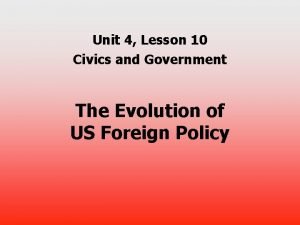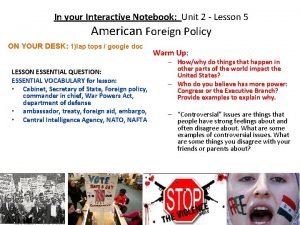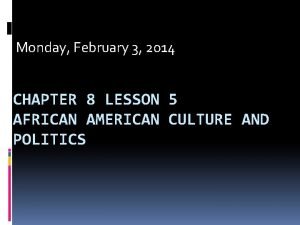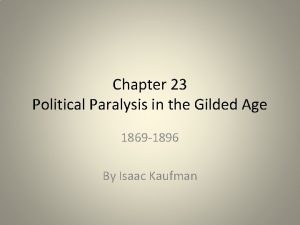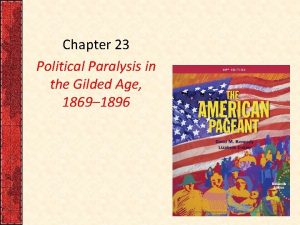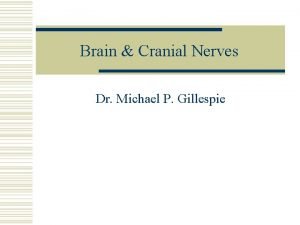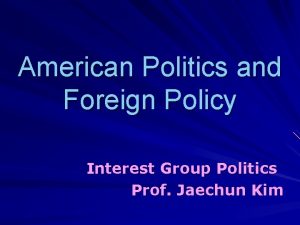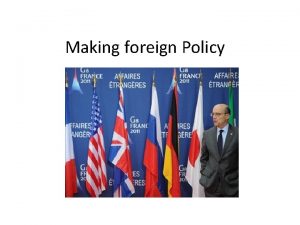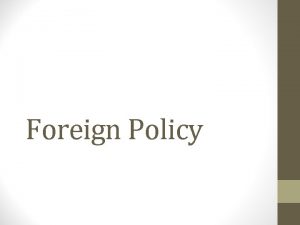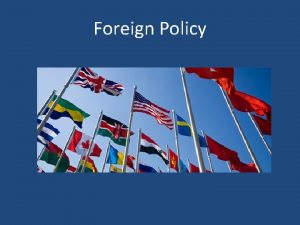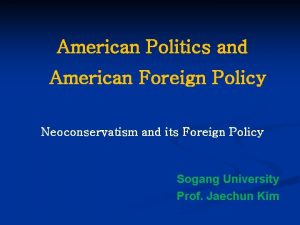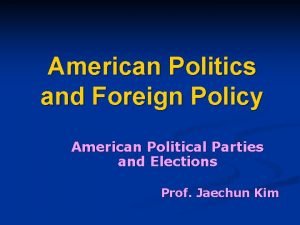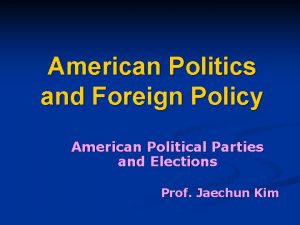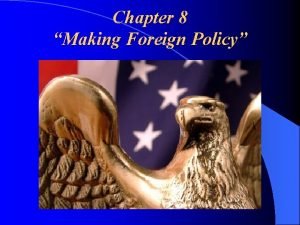Politics and Paralysis American Foreign Policy Foreign policy












- Slides: 12

Politics and Paralysis: American Foreign Policy • Foreign policy defined: the strategies used by governments to guide their actions in the international arena, spell out the objectives state leaders have decided to pursue and the general means by which they intend to pursue those objectives.

Focus of Studies on US Foreign Policy • Structures through which and by which actual policy is made: President, Congress and Public Opinion • Themes in US foreign policy – internationalist versus isolationist – unilateralism versus multilateralism – morality versus realism • US specific views regarding the world

Why is US foreign policy today characterized as fragmented, confused, and conflictual? • End of Cold War • Changing Demographics & Political Culture of US • Globalization of Economy • Changing role of media • Increased role of Congress in Foreign Policy realm • World view of Executive • Increased Bureaucratic Politics • Partisan Politics and Ambition

End of Cold War • Through out Cold War, US foreign policy coherent and consistent • Presence of identifiable enemy provided focus, goals, and justification of large military budget • Collapse of Cold War means we can no longer identify who the enemy is • Has created "nostalgia for the Cold War“ in many areas

Increased role of public opinion and interest groups • Greater role for public opinion in helping determine foreign policy • There is also greater diversity in those opinions leading to greater range of options • Public opinion and interest groups have increasingly played a constraining role on US foreign policy • Public continues to be wary of foreign policy entanglements • Increased number of interest groups have led to increase in their role in foreign policy

Changing demographics and political culture • Drastic changes in society have occurred over last 25 years • Society younger and more ethnically/racially and religiously diverse • Shift in political culture

Economic Changes • Increased economic interdependence fueled by globalization • US budget deficit

The Media • Instant access to world events & decisions regarding those events • Allows greater scrutiny and awareness • Immediate exposure makes it hard to keep secrets • Media Bias

Congress and Executive • • Both branches assume foreign policy role Overlap creates lack of clarity Decisions impacted by what party controls which branch Re-election concerns

Bureaucratic Politics • More agencies involved in foreign policy • Agencies have differing views/interests • Different SOPs

New Challenges and New Enemies • Clash of Civilizations • Global economic inequality • Out of control population growth • Global environmental change • New (and old) arms race • Terrorism

Overcoming Paralysis • Can the US design a prudent, sensible foreign policy that takes into account the new, post-Cold War realities in the world, given the interrelations between strong foreign policy role and strong economic base at home and realistic limits on our willingness and power to act abroad?
 Unit 4 lesson 10 american foreign policy
Unit 4 lesson 10 american foreign policy Lesson 5: american foreign policy
Lesson 5: american foreign policy Lesson 5 african american culture and politics
Lesson 5 african american culture and politics Alternatives to surgery for laryngeal paralysis in dogs
Alternatives to surgery for laryngeal paralysis in dogs Political paralysis in the gilded age
Political paralysis in the gilded age Wegner grossman theory
Wegner grossman theory Chapter 23 political paralysis in the gilded age
Chapter 23 political paralysis in the gilded age Cn iiiv - vestibulocochlear nerve
Cn iiiv - vestibulocochlear nerve Paralysis homeopathic treatment
Paralysis homeopathic treatment Tympania
Tympania Bulbar paralysis
Bulbar paralysis Paralysis agitans
Paralysis agitans Paralysis cerebralis
Paralysis cerebralis
